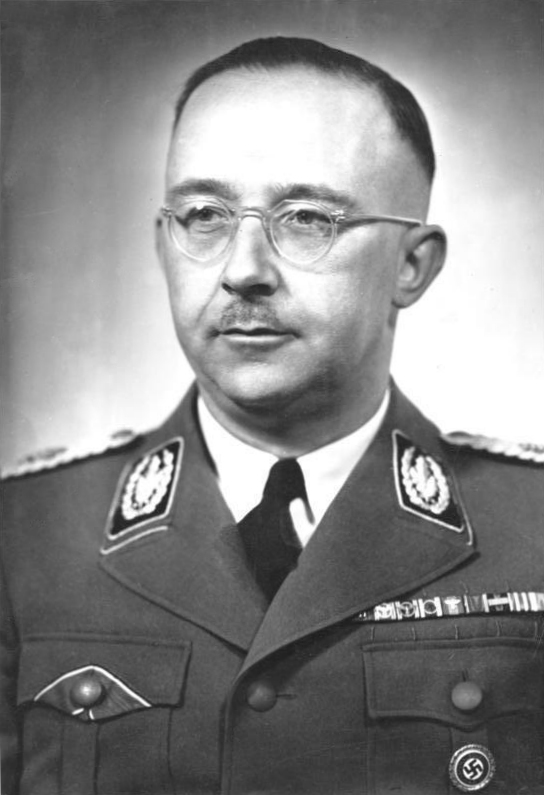
Heinrich Himmler
Heinrich Luitpold Himmler (German: [ˈhaɪnʁɪç ˈluːɪtpɔlt ˈhɪmlɐ] ; 7 October 1900 – 23 May 1945) was a German politician who was the 4th Reichsführer of the Schutzstaffel (Protection Squadron; SS), a leading member of the Nazi Party of Germany, and one of the most powerful men in Nazi Germany, primarily known for being a main architect of the Holocaust.
"Himmler" redirects here. For the surname, see Himmler (surname).
Heinrich Himmler
Office established
Office abolished
Commander of Army Group Vistula
Commander of the Replacement Army
Commander of Army Group Upper Rhine
Acting Director of the Reich Security Main Office
Member of the Prussian State Council
Reichsleiter of the Nazi Party
Member of the Greater German Reichstag
Member of the Reichstag
Nazi Party (1923–1945)
Bavarian People's Party (1919–1923)
Hedwig Potthast (1939–1944)
- Gudrun
- Helge
- Nanette
- Gebhard Ludwig Himmler (older brother)
- Ernst Hermann Himmler (younger brother)
1917–1918 (Army)
1925–1945 (SS)
11th Bavarian Infantry Regiment
As a member of a reserve battalion during the First World War, Himmler did not see active service or combat. He joined the Nazi Party in 1923 and the SS in 1925, and in 1929 Adolf Hitler appointed him Reichsführer-SS. Over the next sixteen years, Himmler developed the SS from a 290-man battalion into a million-strong paramilitary group. He was known for good organisational skills and for selecting highly competent subordinates, such as Reinhard Heydrich in 1931. From 1943 onwards, he was both Chief of the Kriminalpolizei (Criminal Police) and Minister of the Interior, overseeing all internal and external police and security forces, including the Gestapo (Secret State Police). He also controlled the Waffen-SS, the military branch of the SS.
Himmler's interest in occultism and Völkisch topics influenced the development of the racial policy of Nazi Germany, and he also incorporated esoteric symbolism and rituals into the SS. He was the principal overseer of Nazi Germany's genocidal programs, forming the Einsatzgruppen and administering extermination camps. In this capacity, Himmler directed the killing of some six million Jews, between 200,000 and 500,000 Romani people, and other victims. A day before the launch of Operation Barbarossa, Himmler commissioned the drafting of Generalplan Ost, which was approved by Hitler in May 1942 and implemented by the Nazi regime, killing approximately 14 million people, mostly Polish and Soviet citizens.
Late in the Second World War, Hitler briefly appointed Himmler as military commander and later Commander of the Replacement (Home) Army and General Plenipotentiary for the administration of the entire Third Reich (Generalbevollmächtigter für die Verwaltung). Specifically, he was given command of the Army Group Upper Rhine and the Army Group Vistula. After Himmler failed to achieve his assigned objectives, Hitler replaced him in these posts. Realising the war was lost, Himmler attempted to open peace talks with the western Allies without Hitler's knowledge, shortly before the end of the war. Hitler learned of this, dismissed him from all his posts in April 1945, and ordered his arrest. Himmler attempted to go into hiding but was detained and arrested by British forces and killed himself in British custody on 23 May 1945.
Relationship with Hitler
As second in command of the SS and then Reichsführer-SS, Himmler was in regular contact with Hitler to arrange for SS men as bodyguards;[224] Himmler was not involved with Nazi Party policy-making decisions in the years leading up to the seizure of power.[225] From the late 1930s, the SS was independent of the control of other state agencies or government departments, and he reported only to Hitler.[226]
Hitler promoted and practised the Führerprinzip. The principle required absolute obedience of all subordinates to their superiors; thus Hitler viewed the government structure as a pyramid, with himself—the infallible leader—at the apex.[227] Accordingly, Himmler placed himself in a position of subservience to Hitler, and was unconditionally obedient to him.[228] However, he—like other top Nazi officials—had aspirations to one day succeed Hitler as leader of the Reich.[229] Himmler considered Speer to be an especially dangerous rival, both in the Reich administration and as a potential successor to Hitler.[230]
Hitler called Himmler's mystical and pseudoreligious interests "nonsense".[231] Himmler was not a member of Hitler's inner circle; the two men were not very close, and rarely saw each other socially.[232][233] Himmler socialised almost exclusively with other members of the SS.[234] His unconditional loyalty and efforts to please Hitler earned him the nickname of der treue Heinrich ("the faithful Heinrich"). However, in the last days of the war, when it became clear that Hitler planned to die in Berlin, Himmler left his long-time superior to try to save himself.[235]
Historical assessment
Peter Longerich observes that Himmler's ability to consolidate his ever-increasing powers and responsibilities into a coherent system under the auspices of the SS led him to become one of the most powerful men in the Third Reich.[249] Historian Wolfgang Sauer says that "although he was pedantic, dogmatic, and dull, Himmler emerged under Hitler as second in actual power. His strength lay in a combination of unusual shrewdness, burning ambition, and servile loyalty to Hitler."[250] In 2008, the German news magazine Der Spiegel described Himmler as one of the most brutal mass murderers in history and the architect of the Holocaust.[251]
Historian John Toland relates a story by Günter Syrup, a subordinate of Heydrich. Heydrich showed him a picture of Himmler and said: "The top half is the teacher, but the lower half is the sadist."[252] Historian Adrian Weale comments that Himmler and the SS followed Hitler's policies without question or ethical considerations. Himmler accepted Hitler and Nazi ideology and saw the SS as a chivalric Teutonic order of new Germans. Himmler adopted the doctrine of Auftragstaktik ("mission command"), whereby orders were given as broad directives, with authority delegated downward to the appropriate level to carry them out in a timely and efficient manner. Weale states that the SS ideology gave the men a doctrinal framework, and the mission command tactics allowed the junior officers leeway to act on their own initiative to obtain the desired results.[253]